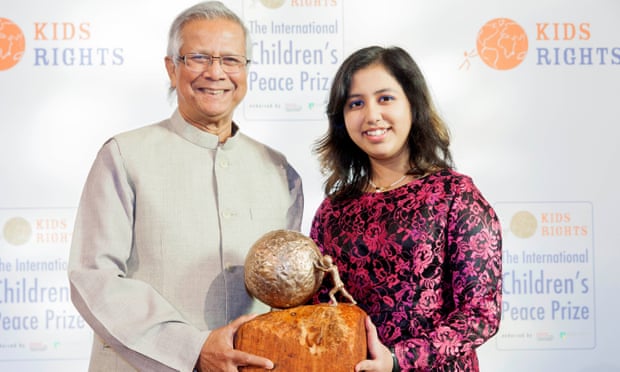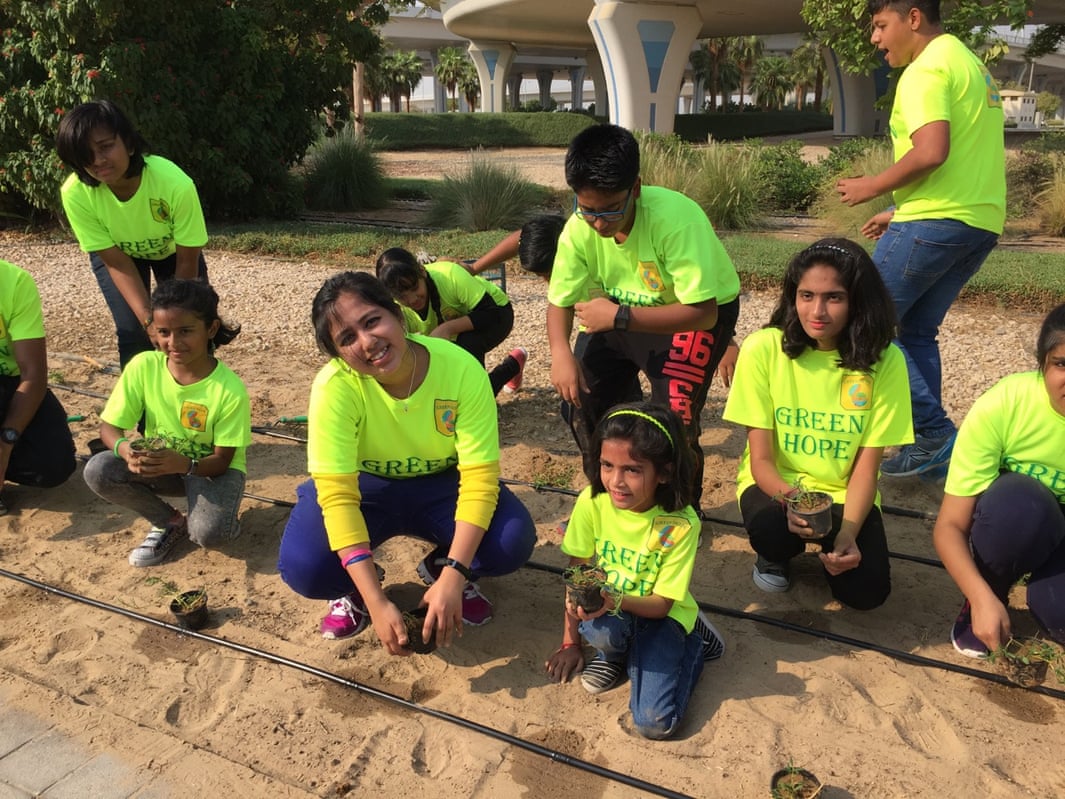Kehkashan Basu’s activism began when she planted a seed in her parents’ garden. Thousands of trees later, she has inspired young people and won a peace prize
 | |
| Kehkashan Basu accepts the Children’s peace prize from social entrepreneur Muhammad Yunus. Photograph: Rick Nederstigt |
Supported by
By Gerrishon Sirere
When she turned eight, Kehkashan Basu decided that she was grown up enough to begin her lifetime’s work. And so on her birthday she planted a sea grape seed in the garden of her parents’ apartment block in Dubai.
“I was born on 5 June, which is World Environment Day,” says Basu . “I thought it was preordained that I’d grow up to take care of mother earth and become an eco warrior. So at the age of eight I thought I could start doing something good for the planet on my own.”The plant is still going strong and Basu’s activism is also going from strength to strength. Earlier this month she was awarded the Children’s peace prize, started by charity KidsRights, for her eco work. Now 16, Basu’s goal is to mobilise children across the world to help promote sustainability.
Basu’s achievements outstrip those of the most ambitious teenagers. After planting her sea grape tree, she started doing ground-level environmental campaigning when she was nine, and was elected the United Nations Environment Programme (Unep)’s global coordinator for children and youth at the age of 12. In the same year, she founded her organisation Green Hope, which advocates for grassroots environmental youth activism and eco education.
 | |
| Planting trees with Green Hope. Photograph: Green Hope |
Basu believes that carbon offsetting is the way forward. People cannot be expected to sacrifice everything, she says.
“For everything I do that has a big carbon footprint, I plant trees based on the carbon dioxide emitted, so you don’t feel guilty about doing something,” she says. “You have to live your life, so whatever you do you start by offsetting. Tree planting is the simplest and most effective way of doing this.” Basu has travelled the world for her work – that must mean a lot of trees dotted across Dubai.
Basu admits that many of her classmates had “the misconception that the environment was boring”. But Basu, determined as ever, turned attitudes around and soon had her school planting trees and cleaning mangrove plantations. “We kayak into the mangroves, clean up the plantations and then kayak back.” The work has had a powerful impact on her classmates. “They realised what was at stake – our future – and they got involved.”
Children are ideal people to educate, Basu says, not just because they will be around for longer, but because they wield an influence many people underestimate: “A lot of children can convince their family and schools – and from there it grows out.”
Basu visited restaurants in the Al Qusais area of Dubai to talk them into recycling, and she convinced beauty salon owners to stop using harsh chemicals. Then she started spreading the message via her friends and talking to nearby schools. Al Qusais is near the industrial area of Dubai, which proved to be advantageous. “If I spread awareness at schools, they would spread it to the parents who work in the industrial area,” she explains.
There’s no doubt Basu’s parents have been enormously influential. She says her work was inspired by them as they were always diligent about reducing waste – turning off lights, not wasting water – and going to charity drives every Friday night. “They’re always behind me, whatever I choose to do, and they always tell me to follow my dreams and not let others put me down.”
Her father is a general manager for a company that distributes electronic products in the United Arab Emirates, and her mother is the programme coordinator of Green Hope. So she is her mother’s boss? There’s a slight pause. “I wouldn’t say boss because we are all equal in my organisation. But yeah, I work with my mom,” she says.
It’s easy to forget that Basu is a teenager. She’s more intelligent and better informed than most adults, as well as diplomatic. When asked about Donald Trump’s climate-sceptic stance she doesn’t go off on an adolescent rant about older people ruining the future for the young, but says instead: “We live in uncertain times … we should continue to do what we’re doing and not lose hope.”
Her Twitter feed features pictures of her at conference or of children wielding plastic bin bags and picking up litter in Dubai. “I have been practising time management since I was eight,” she says when asked how she fits in school work around everything else.
Does she ever feel like she’s missing out on the carefree fun of being a child? “I think everyone’s definition of fun is different,” says Basu. “I love doing my work. If I didn’t love it, I wouldn’t be doing it. I have involved so many children, including my friends, and we enjoy it.”
When she’s not doing schoolwork or environmental campaigning, Basu plays the piano (she’s just passed her grade eight exams) and the guitar. “My favourite band is the Beatles, I think they’re awesome.”
Asked to name her inspirations, Basu says Ban Ki-moon and Achim Steiner, former executive director of Unep. Anyone slightly less bureaucratic? “Wangari Maathai and Jane Goodall. Green Hope works extensively with Maathai’s organisation, the Green Belt Movement, and with the Abu Dhabi branch of Goodall’s Roots and Shoots. It’s female empowerment as well as doing stuff for the environment.”
Gender equality is part of Basu’s vision. “Without it you cannot achieve a sustainable world. Both halves of humanity need to work together.” Basu has been subject to the sexism many women and girls experience, including being told that she couldn’t be a pilot when she expressed an interest in it as a young girl. People also ask why she wants to be CEO of her own organisation “because that’s something for males”. The negativity hasn’t put her off: she wants to expand Green Hope to every country , and even though she still has two years of school left, she’s already set her sights on an MBA at Harvard.
When she was 12, Basu gave a rousing speech to Unep’s governing council. In it, she quoted Mother Teresa: “Yesterday is gone. Tomorrow has not yet come. We have only today. Let us begin.” She already has.






No comments:
Post a Comment